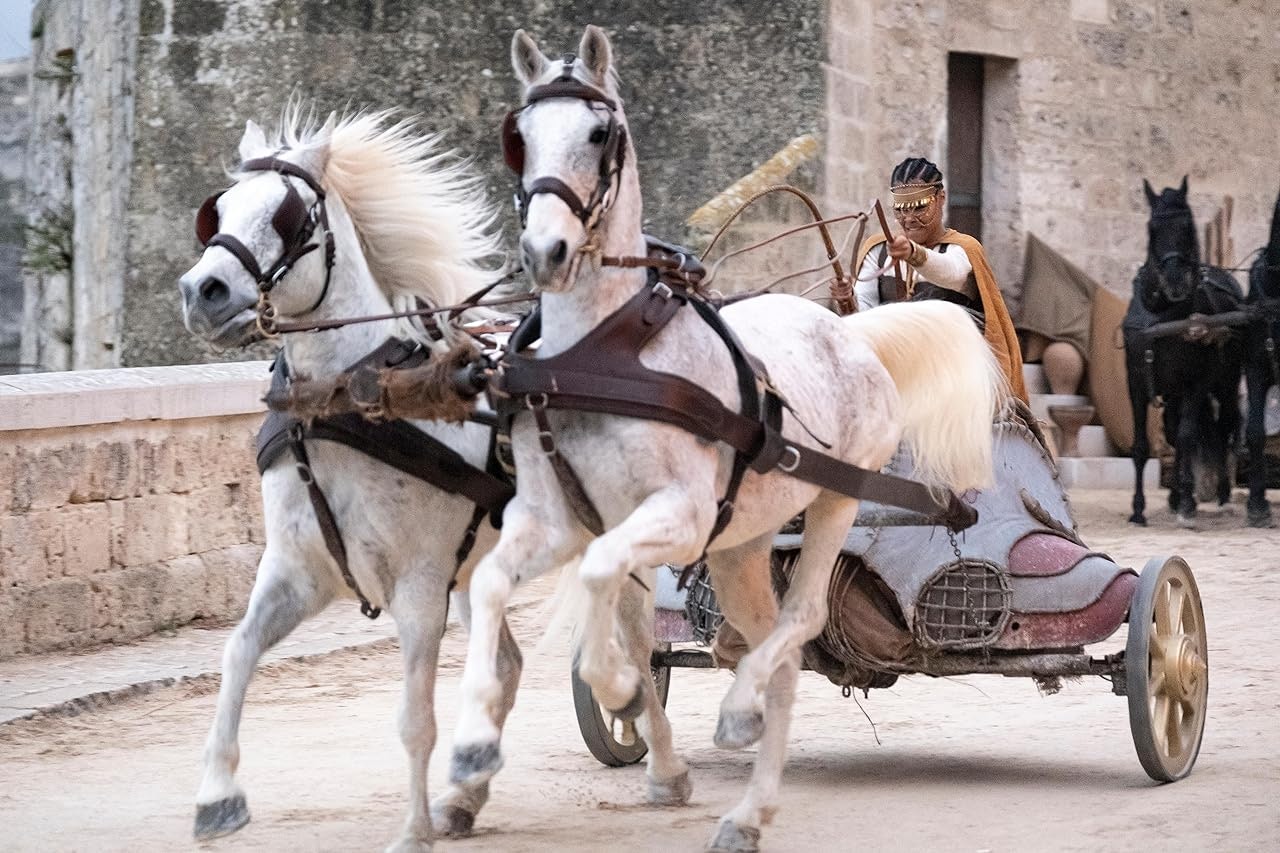
It is a miracle that The Book of Clarence even exists.
The latest film from the mind of Jeymes Samuel (The Harder They Fall) was born out of the desire to remix the Biblical epics of the 1950s. Often spectacular, yet predominantly white, those films almost never portrayed the world as it really was when Jesus walked the Earth. Such epics as King of Kings and Ben-Hur also focused exclusively on one man’s journey of faith — but with The Book of Clarence, Samuel wanted to zoom further out and depict a more realistic portrait of life in the land of Judea.
“Who was in the hood?” Samuel once asked about heroes of the gospels. “Who was the troublemaker or the cool dude that the girls liked? Who was the kid with aspirations?” In attempting to answer those questions, The Book of Clarence takes on the slice-of-life qualities of a rollicking stoner comedy, drawing more parallels to Monty Python than to the sincere biblical blockbusters of old. But Samuel does really want to leave those sensibilities behind — in fact, he seems determined to tread lightly, and respectfully, on our ideas of the messiah myth. What results is a story with one foot in the past and one in the future, but without the capacity to fully merge those two worlds together.

At first blush, The Book of Clarence seems like a film designed for a much more cynical generation. Its title hero (played by LaKeith Stanfield) doesn’t believe in much beyond his own intellect. He’s a much more realistic protagonist for a pragmatic world — but in the year 33 A.D., he’s quickly becoming an anomaly.
Clarence lives in an age of miracles and messiahs, though he notably subscribes to neither. While his twin brother Thomas (also Stanfield) has taken up his cross to follow the one and only Jesus Christ, Clarence carves out a life of his own: dealing “lingonweed” with his best friend Elijah (RJ Cyler), competing in chariot races against Mary Magdalene (Teyana Taylor), and openly pining over the fairest girl in Jerusalem (Anna Diop). Unfortunately, Clarence also owes a considerable debt to her brother, a minor kingpin named Jedediah the Terrible (Eric Kofi-Abrefa). With only a month to pay his debts, Clarence needs a miracle — whether he believes in them or not — and despite his well-established atheism, a miracle is exactly what he sets out to manufacture.
Clarence’s righteous rebrand takes a while to fully stick. While he is, in a way, attempting to walk in Jesus’ footsteps, he’s more interested in capitalizing on his clout than he is in genuinely improving the world. Conversations with the Virgin Mary (Alfre Woodard) and John the Baptist (a hilarious David Oyelowo) split the difference between irreverent skits and thought-provoking debates on the theology. At first, it’s all hokum to Clarence, but his attempts to create a new brand of messiah will soften his heart before too long.

Samuel — who serves as writer, director, and composer here — bobs and weaves between Clarence’s skepticism and his peers’ earnest belief. The truth behind Jesus and his miracles feels up to interpretation at first, especially as Clarence’s jabs at the hypocrisy of the church hit increasingly closer to home. A quick survey of his hometown reveals a city in turmoil, one choked by inequality and economic disparity. It’s not unlike the disenfranchised communities in our present day: The players are the same, as are their struggles. And despite that suffering, nothing ever changes — even with miracle workers walking amongst the everymen. Clarence sees it all, and for all his outward cynicism, he wants to do something about it.
As his down-to-earth teachings inspire followers, so too does a change begin to blossom in Clarence. His gaze turns outward to the lives of his followers — and it’s here that The Book of Clarence might shine the most. The strength of this film rests almost entirely in its worldbuilding: Samuel’s take on Jerusalem splices small-town hood classics with the rustic classicism of a period film. That the majority of Samuel’s cast just so happens to be Black only strengthens those parallels between the old world and the new. The Roman occupation, meanwhile, is a not-so-subtle stand-in for police brutality, allowing The Book of Clarence to explore the modern martyrdom of Black youth through a less-explored lens.
Samuel’s debut took a similar approach to the spaghetti Westerns that dominated the ’60s and ’70s, enlisting a cast of all-star Black actors in a bombastic dose of counter-culture. The Book of Clarence follows the same path as The Harder They Fall, but there’s a sense of reverence in Samuel’s approach to the messiah myth. Unlike Samuel’s first film, or Life of Brian, or even sillier satires like Year One, The Book of Clarence is unmistakably sincere. It takes a sharp turn before its many gags skew too far into blasphemy, cribbing hard from conversion narratives and films like Passion of the Christ.

Paired with Samuel’s overwhelming score and a much more Bible-accurate depiction of the gospels, Clarence’s second half feels torn between two schools of thought. It doesn’t help that its title hero’s own conversion — which was always inevitable — lacks the heft to carry the film’s operatic ending. Stanfield remains committed to both comedic beats and dramatic, providing Clarence with the one element it needs to stick the landing: conviction.
It’s not quite enough to help this ambitious story gel, but you can’t fault Stanfield, Samuel, or the rest of this staggering cast for trying. The Book of Clarence is an anomaly even from a post-post-modern perspective: it may have trouble finding an audience that appreciates both sides of its story, but it’s least it makes an attempt at reclaiming the original Hollywood blockbuster.







